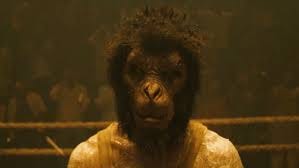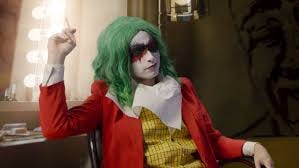Transitions
My thoughts on Monkey Man and The People’s Joker
For his directorial debut, Monkey Man, Dev Patel stars as an anonymous young man from the slums of Mumbai who has adopted the name “Bobby” and who makes his meager living at underground bare-knuckle brawls where he fights in a monkey mask and serves the same basic purpose that the Washington Generals do in their matches against the Harlem Globetrotters. As a child living in the forest with his beloved mother, he saw her killed and his entire community destroyed at the hands of a power-hungry, money-mad pseudo-spiritual guru and the monstrous corrupt police chief (Sikander Kher) that he controls. Now he bides his time, slowly waiting for his moment to brutally dispatch them and anyone unlucky enough to get in his way. When his initial attack fails to accomplish those goals and leaves him near-death, he is found and nursed back to health by a community of trans people forced to live on the margins of society. After undergoing the usual amount of physical and spiritual rehabilitation, he is ready for one final attack—timed to occur at the same time as a nationwide election that could secure incredible power for the mad guru—and the last section of the film is essentially one long and grisly brawl in which skulls are crushed, digits are severed and virtually every surface area gets splattered with blood.
Essentially a bizarre cross between the John Wick franchise (which the film explicitly references at one point) and Slumdog Millionaire, the film Patel is most famous for, Monkey Man is, to be sure, a wildly mixed bag. Patel is, of course, an enormously charismatic screen presence and as he punches, kicks and chops his way through untold amounts of henchmen, he more than adequately demonstrates his action hero chops. Behind the camera, his work may not be particularly deep or personal but the action beats (which essentially break down into two major fight sequences that comprise about half of the film’s entire running time) are captured with a certain style and he certainly doesn’t not skimp on the gore in the slightest. The problem is that the screenplay by Paul Angunawela and John Collee (devised from a story dreamt up by Patel) doesn’t really offer up much of interest during the sequences that don’t involve character pounding the crap out of each other—the story doesn’t really offer much of anything in the way of surprises, the whole middle section featuring our hero’s spiritual and physical rebirth is a drag and while bringing in the trans community to serve as a reminder of the brutal conditions faces by those on the wrong end of the caste system, you get the feeling that Patel is using their very real plight as a way to give some substance to his otherwise heedless punchfest. (To be fair, the stuff involving the trans people does have an undeniably crowd-pleasing payoff.) Monkey Man has its moments, to be sure, but the film as a whole is just too predictable and overloaded for its own good. As a demo reel for Patel’s potential career as an action film con, it sort of works but as a demonstration of his abilities as an action film director, it ultimately leaves something to be desired.
It is unlikely that we will be seeing a new film this year that is quite as conceptually audacious as The People’s Joker, the debut feature from writer-director Vera Drew that takes the Batman mythos—without any permission from DC Comics or Warner Brothers—and remixes it into a transgender coming-of-age story in such wild ways that WB threatened legal action following its debut at the 2022 Toronto Film Festival. (The film currently opens with a long and detailed title card making a case for it being protected from legal action under the terms of fair use.) Drew also stars as Joker the Harlequin, an aspiring trans comedian who moves from Smallville to Gotham City in the hopes of landing a spot in the cast of UCB Live, a late-night sketch show from Lorne Michaels (Maria Bamford) that is the only legal form of comedy allowed. When that fails, she and a number of fellow comedians—all of whom are embodied by members of the Batman rogues gallery—form their own troupe that they label as being “anti-comedy” in order to get around the law, a gambit successful enough to land her a shot host UCB Live. At the same time, Joker is negotiations her first real relationship with Mr. J (Kane Distler), a fellow comedian clearly inspired by Jared Leto’s version of the Joker who seems great at first but who proves to be an emotionally manipulative narcissist that she nevertheless finds it hard to leave.
According to reports, The People’s Joker was shot in around five days, almost entirely in front of green screens, and farmed out effects shots and animated elements to a wide variety of contributors. While the results are inevitably a bit uneven and frankly exhausting after a while, the DIY aesthetic does have a certain ragged charm, giving the proceedings a crazy stylistic touch that is ultimately more memorable than what most of the recent straightforward superhero epics have accomplished with their formulaic CGI efforts. Beyond the wild surfaces and avalanche of Batman-related references (pretty much covering the entire history of the character), the film serves as a strange but ultimately affecting attempt by an artist to use the elements of American popular culture at its broadest to help come to terms with their attempts to come to terms with who they are. That said, the film is even more successful as a brutally and bitterly amusing skewering of contemporary comedic standards and the need for outsiders to go up against institutions that have long traded their edge for commercial success. Not everything about The People’s Joker works and some viewers may find themselves growing weary with it after a while due to the way that it burns through its litany of ideas. However, the go-for-broke spirit demonstrated here by Drew is undeniably endearing and I am definitely interested to see what she will come up with next.



